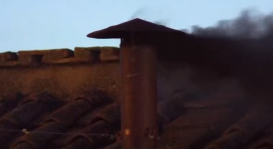
Bono, lead singer of the rock band U2, has said he is "suspicious" of many Christian musicians today because they exhibit a lack of "realism" in their music, and reminded such artists that God wants his people to be honest and authentic with their work.
On Tuesday, Bono and Bible translator Eugene Peterson released a short film entitled "The Psalms," which focuses on the Old Testament book as the foundation for the duo's friendship.
During the film, the Irish singer offered some advice for Christian musicians: "I find in Christian art a lot of dishonesty, and I think it's a shame," Bono said.
"I would love if this conversation would inspire people who are writing these beautiful... gospel songs, write a song about their bad marriage. Write a song about how they're pissed off at the government. Because that's what God wants from you - the truth. That truthfulness, that truth will set you free and blow things apart," the "Vertigo" singer added.
"Why I am suspicious of Christians is because of this lack of realism, and I would like to see more of that in art, in life and in music."
The video, released through the California-based Fuller Theological Seminary's new media venture "Fuller Studio," first shows a 2002 video of Bono, who often quotes passages from The Message during concerts, thanking Peterson, on behalf of himself and other U2 band members, for the translation work that he has done.
In turn, Peterson said he first heard of Bono when someone showed him a Rolling Stone interview in which the singer mentioned Peterson's writing.
At the time, the pastor didn't know who Bono was, as he had never paid attention to U2 or rock n' roll music. After listening to the singer's music, however, Peterson quickly grew to like Bono, realizing that he was a brother in faith.
Peterson eventually met Bono in person in 2009 when he was invited to come to a concert in Dallas. During the trip, Bono and Peterson sat down for a three-hour lunch, and became fast friends.
"We had a lovely conversation. It was just very personal, relational. He didn't put me on any kind of a pedestal and I didn't him. So we were very natural with each other," Peterson recalled. "I was just ... I was just really taken by the simplicity of his life, of who he is, there was no pretension to him. At that point, I felt like he was a companion in the faith."
The documentary then explains how U2 ended its North American tour by playing the song "40," which has lyrics adapted from Psalm 40.
"I think it is one of his best songs. He sings it a lot. It is one of the Psalms that reaches into the hurt and disappointment and difficulty of being a human being," Peterson continues. "It acknowledges that in a language that is recognizable and reaches into the heart of the person, the stuff we all feel but many of us don't talk about."
The second part of the documentary is filmed at Peterson's home in Flathead Lake, Montana, where Peterson and Bono discuss the Psalms in a conversation moderated by Fuller Theological Seminary professor David Taylor.
"We are at Eugene and Jan Peterson's home and Bono is flying here from Vancouver in order to meet, be together, connect as friends, but also to have a conversation about the Psalms in order to share this common love for the Psalms and bear witness to others about the beauty and power of the Psalms," Taylor explains in the video.
During the conversation, Peterson said that as a child, he was extremely confused by the Psalms, because he came from a culture where "every word in the Bible was the Word of God, literally."
"I think the Psalms are important because for some people, like me at 12 years old, it showed me that imagination was a way to get inside the truth," Peterson says.
Bono reveals that as a child, he thought that the Psalms had great words but "it was a shame about the tunes" - except for Psalm 23 (the Lord is my shepherd), which he believed had a great melody and lyrics.
Bono and Peterson were then asked how Christians should address the need for violence that lives in their own hearts.
"We need to find a way to cuss without cursing," Peterson suggests. "The Imprecatory Psalms surely do that. They just lay it out and I just think they are really important ... if we have to have some way in context to tell people how mad we are."
Bono agrees "I love the idea of finding a way to cuss without cursing and you have to give vent to that."
The documentary is produced by Fourth Line Films and directed by Fourth Line's Nate Clarke.
"Our hope is that as a result of watching the film, people will be curious or inspired to read the Psalms themselves and to discover this remarkable book of poetry in Holy Scripture that has captured Bono and Eugene's imaginations," David Taylor, the film's producer and director of Brehm Texas, which is an initiative of Fuller Seminary's Brehm Center for Worship, Theology and the Arts told the New Boston Post.
He added that the film will "connect with fans of U2, fans of Eugene's writing, church and lay leaders, artists, worship leaders, and folks involved in the intersection between faith and culture."







